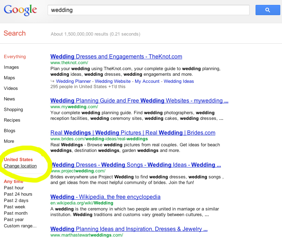A common question raised among our clients is “how do the search engines determine between local search or global search?” In other words, how do search engines know what you’re looking for? Do they really know the difference between “wedding” and “wedding nj”?
If your keyword can be identified as global or local, the next thing search engines will look at is your intent. If your search is localized or can be considered localized, the search engine will deliver local results. If you’re searching “wedding,” the search engine may go either way, delivered local results in the Google local section, but maybe delivering broad websites in organic results.Well, one of the first things search engines look into at is your location. Search engines will identify your location and whether or not your keyword combination has any local intentions. In Google, you can set your location settings accurately or to where you intend on have a “wedding.” If you set your location settings to a more broad setting (ie: United States) you will get more broad results.
Search engines will also crawl data and reference other searches you’ve conducted to try and relate them to your current search. Aside from your search history, search engines will aggregate information and data from other users to try and best pinpoint what your intent is. How frequent is your keyword combination used? Are other users looking for local or global results? How many clicks on Google local were there based on this search combination? And so on and so forth.
Since Google has been initiating Panda updates and updating its privacy policy, there’s no doubt their efforts are aimed towards localizing searches. Because more and more often search results are localized, it may or may not be what you’re looking for. Remember to use geographical references in your searches depending on the location you’re searching within. You can also edit your local in Google. Located in the left column is the option to change your location, just add your city or zip code and your search results will become localized. If you want to search nationally, use “United States.”

